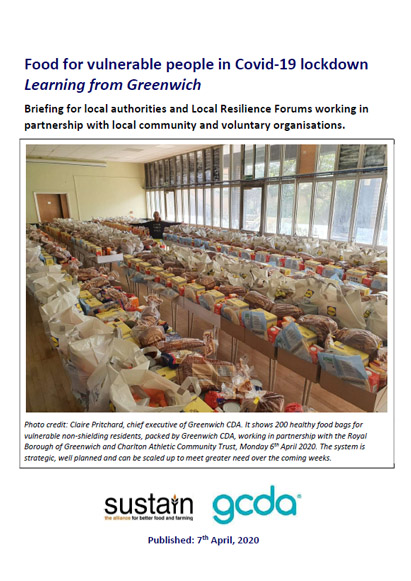Reports • Coronavirus Food Alert
Food for vulnerable people in Covid-19 lockdown: Learning from Greenwich
Briefing on organising food for vulnerable people in Covid-19 lockdown - for local authorities and Local Resilience Forums working in partnership with local community and voluntary organisations.
This briefing aims to inform strategic emergency planners, local authorities, food partnerships, Local Resilience Forums (LRFs) and voluntary sector groups – especially those working in partnership to organise food provision – at large scale – for vulnerable people needing to self-isolate or stay at home during Covid-19.
The publication can be downloaded free of charge - click on "No Donation". Any donations received will be put towards the Covid-19 food relief effort.
The first headline to take from this briefing is this: There is not enough free food or volunteer capacity to feed all economically vulnerable people through local authority and charitable means. Vulnerable people must have their needs "triaged" to direct them to the appropriate support, including local authority welfare assistance grants. This is the "money first" principle, so that as many people as possible can buy their own food; relieving local authorities, LRFs and charities to focus on those most in need.
Then, if we can bring the scale of food need down to a manageable level, we have a chance of being able to feed the people who are most in need – those who cannot access food by any other means. Learning from Greenwich and other places, vulnerable people requiring food support need to be identified as:
- People who are financially secure but cannot shop, i.e. those with no other support network. They can pay for food, but need to have it delivered. They may not have sufficient money to afford minimum order thresholds for delivery, so may need volunteers to help with shopping.
- People who are financially insecure and cannot shop, including those in crisis. They need to receive free food support, and may have other needs. So the food needs to be safe, nutritious, appropriate and easy to prepare (for example in places where kitchen equipment is limited to just a kettle).
- People who are financially insecure and can shop. They need to receive financial support to be able to buy the food they need, such as welfare assistance grants.
The briefing shares the Covid-19 response pathway, triage and payment systems, and packing lists for four types of Food Boxes, developed by Greenwich Cooperative Development Agency, working in partnership with the Royal Borough of Greenwich and Charlton Athletic Community Trust. Within just two weeks of establishment, it is already delivering 200 Food Boxes that meet Covid19-safe as well as nutritional guidelines, also supported by the local authority environmental health team to ensure food safety, for vulnerable non-shielding residents in Greenwich. It is providing food for vulnerable people who can afford to pay for it (with a payment scheme), and for people who are not able to pay.
Food procurement by the local authority is directed via local food businesses to support the local food economy and jobs that Greenwich’s diverse communities rely on in the longer term. The system is strategic, well planned and the organisers are confident that this can be scaled up to meet greater need over the coming weeks.
The authors of this briefing (published 7 April 2020) are:
- Claire Pritchard, Chair of the London Food Board that advises the Mayor of London on food policy for the capital; also chief executive of Greenwich Cooperative Development Agency, which is working in partnership with the Royal Borough of Greenwich and Charlton Athletic Community Trust to provide food for vulnerable people in Greenwich during Covid-19.
- Kath Dalmeny chief executive of the charity Sustain: The alliance for better farming, whose members include the main UK food bank and charitable food aid distribution associations; advisor to the London resilience forum; member of the London Food Board; and participating in regional and national strategic groups advising on food for vulnerable people during Covid-19.

Food for vulnerable people in Covid-19 lockdown: Learning from Greenwich
8pp - 2020 | 3,000Kb
Published Thursday 9 April 2020
Coronavirus Food Alert: Sustain's work on food resilience in the COVID-19 coronavirus pandemic.We are helping secure food for vulnerable people and supporting local emergency responses.